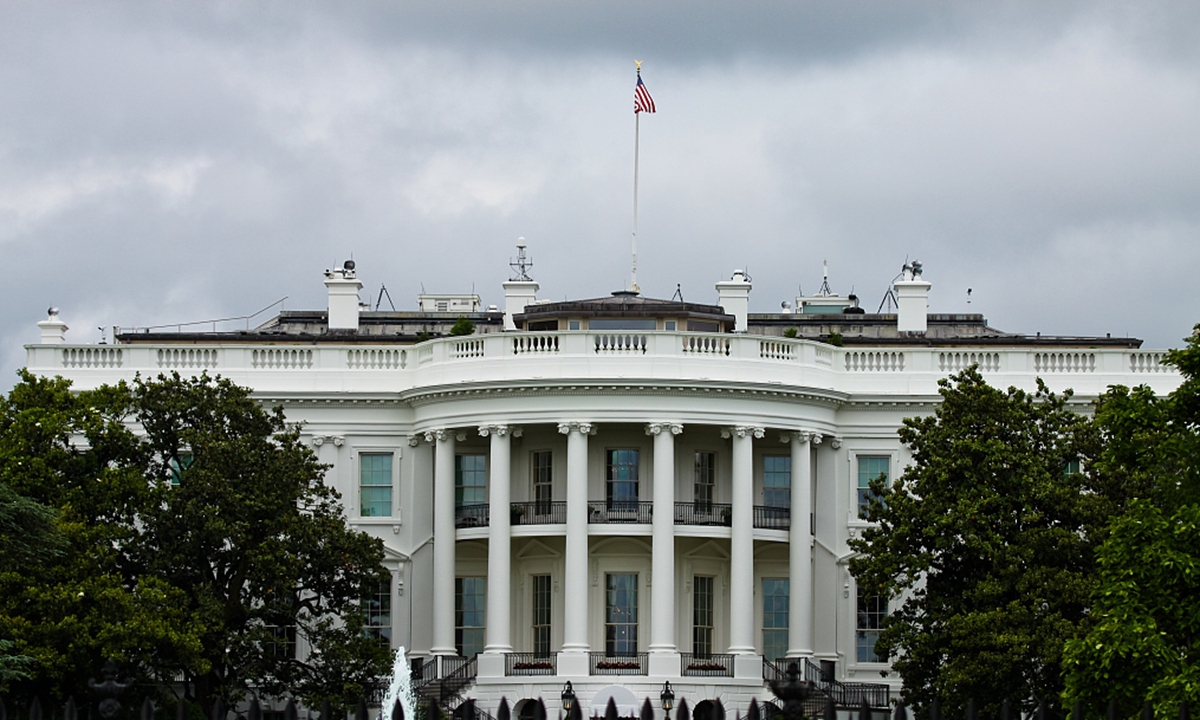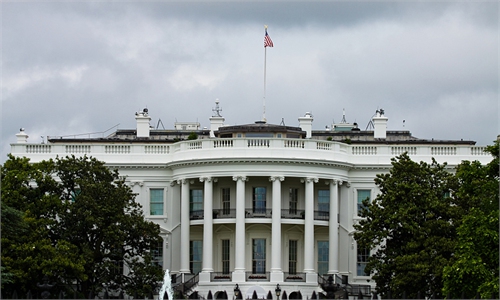Chinese FM slams US’ attempt to ‘outcompete China’ with $100 million defense aid to Taiwan listed in Biden’s FY2025 budget

White House Photo: VCG
The Chinese Foreign Ministry on Tuesday slammed the US' attempt to "outcompete China," and vowed to take measures to firmly safeguard its sovereignty and territorial integrity in terms of the Taiwan question, after the White House released its budget proposal for 2025 Financial Year, which includes billions of spending for its "Indo-Pacific" strategy to contain China and a 100 million request to arm Taiwan authorities through the Foreign Military Financing (FMF), a mechanism typically saved for sovereign nations.
US President Joe Biden on Monday local time proposed a in a $7.26 trillion budget plan for FY 2025, a 4.7 percent surge year on year. It includes a defense budget request of $849.8 billion, targeting "persistent threats" from countries Russia, North Korea and Iran and "pacing challenges" from China in "Indo-Pacific" region.
The budget also provides $4 billion "to realize a more free, open, secure, and connected Indo-Pacific that bolsters US alliances and partnerships," according to the fact sheet release by the White House.
The "Indo-Pacific" package also includes $2.1 billion in bilateral and regional foreign assistance, including $100 million for a standalone request for Taiwan military assistance.
The US State Department described the 100 million in funding Taiwan an "historic investment in Taiwan's security including new bilateral Foreign Military Financing (FMF) request," to "strengthen deterrence and maintain peace and stability across the Taiwan Straits," media reported.
In response to media questions on "historic," deputy Secretary of State for Management and Resources Richard Verma said it meant there would be a dedicated funding item for Taiwan.
"We must employ all the tools at our disposal to outcompete China wherever possible," Verma remarked.
At a press briefing on Tuesday, Chinese Foreign Ministry spokesperson Wang Wenbin slammed the US attempt to "outcompete China."
According to Wang, the so-called "competition" mentioned by the US side is not benign competition in which one chases for common progress. Rather, it is a vicious competition in which the opponent is trapped and obstructed at every turn. It is a big gamble in the fundamental interests of the two peoples and even the future and destiny of mankind, which will only push China and the US into confrontation and conflict.
We hope that the US will correct its wrong perception of China, abandon its zero-sum mentality, and promote the sound, stable and sustainable development of China-US relations, Wang said.
In terms of the Taiwan question, Wang stressed that China firmly opposes military contacts between US and Taiwan authorities and arming Taiwan. "We urge the US side to abide by the one-China principle and stop interfering in China's internal affairs. China will take resolve measures to firmly safeguard its sovereignty and territorial integrity."
Chinese analysts said the US move hinted at more political than military implications.
According to Xin Qiang, director of the Taiwan studies center at Fudan University, the pernicious nature of the US move is that the MFM is always offered to sovereign nations, which means the US is treating Taiwan as a "state entity," even a paramilitary ally. And that violated the one-China principle.
In August 2023, the Biden administration has approved an $80 million military transfer to Taiwan island through the FMF program.
Foreign military financing, to some extent, suggests a resumption of US military aid to Taiwan since 1979, when the arms sales dominated in past decades, Xin said, "The US is moving a small step forward in providing defense support to Taiwan authorities, which takes more diverse forms than in the past."
Despite 100 million not being a huge amount compared with past US military sales to Taiwan island, Xin said the US is testing the reaction of the Chinese mainland.
If there is no strong response from the Chinese mainland, the US is likely to continue to expand the scale and the amount in the future, Xin said.
"This is a familiar US tactic," Xin said, "having set a precedent, it later makes it the new norm gradually."
The budget plan also came amid the rising tension cross the Straits after the fatal fishing incident. And the situation seems unlikely to return to calm in the future.
According to a Wall Street Journal report on Tuesday, secessionists Hsiao Bi-khim, the running mate of Lai Ching-te who is set to take the post of Taiwan regional leader in May, is in Washington this week "for a low-profile private visit." While Mike McCaul, who leads the House Foreign Affairs Committee said on March 6 that he will lead a delegation to Taiwan to celebrate Lai's election, as 2024 also marks 45 anniversary of "Taiwan relation act."
US moves are likely to be interpreted as support and encouragement for the secessionist Taiwan authorities, and the Chinese mainland should be highly vigilant about the cross-Straits ties and collusion between US and Taiwan island, Xin added.


